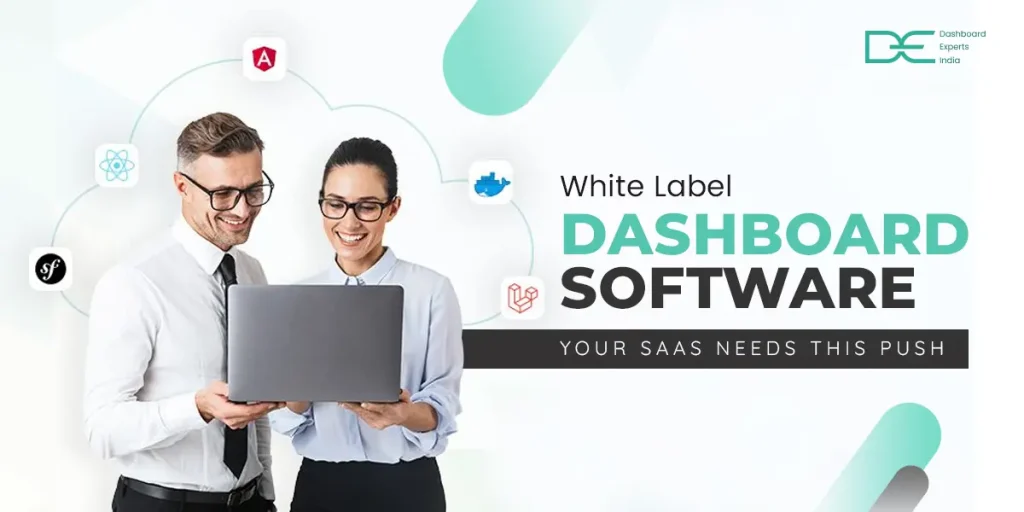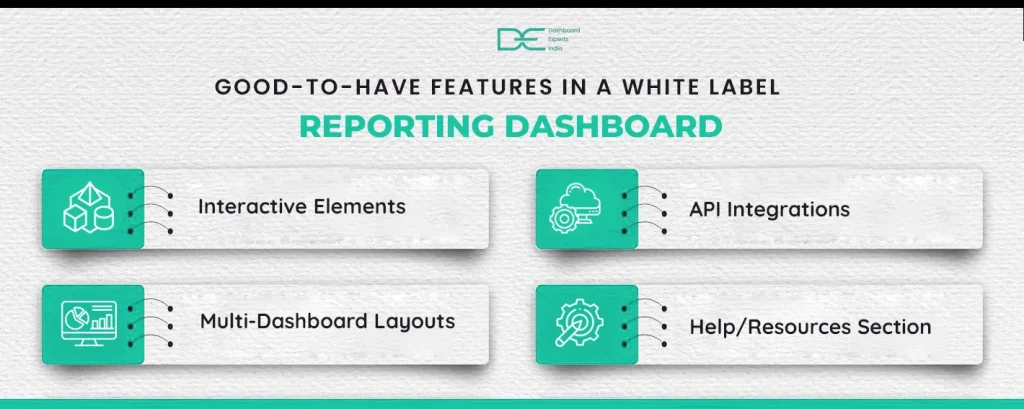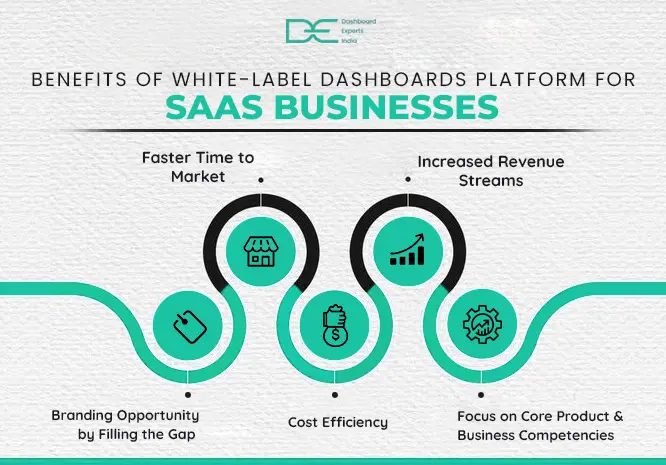White Label Dashboard Software: Your SaaS Needs This Push
Businesses love stats. It adds a ton of values, brings clarity, empowers decision making, and facilitates control. But more importantly, it intensifies collaboration and coordination between individuals and departments. That’s why white label dashboard solutions are gaining popularity among the management layer across industries. And you, as a Software as a Service (SaaS) provider, can expand your offerings as well by providing your client with a dashboarding as a game changer.
However, there is a catch. The competition in the domain of Software as a Service SaaS is fierce thanks to the lower entry barrier. More startups enter space and deliver solutions quicker with their agility, small size and flexible operations. So, before you define the objectives and goals, they might be in the testing phase, getting it ready to deploy.
So, is there any faster method? Yes, white label dashboard software. And we will discuss everything in this blog – definition, benefits, examples, how to get it, the inherent challenges, and more.
What is a White Label Dashboard Software? What it does?
White label dashboard software is a ready-made solution waiting for branding and packaging. So, once you find the right dashboard compatible to your business, all you need is to ask the dashboard development company to do the branding and packaging for you.
This saves your time and resources that otherwise would have gone for months in the development process of such a sophisticated solution. This sophistication will not only keep your customers happy, but you might get it in a matter of days, not even weeks.
So, in short, white label dashboard are:
- Completely customized solution
- Take less time-to-market
- Highly sophisticated
- Keep you users happy
Features of White Label Dashboard Platform
Although there is no limit to the number of features that you get into your white label dashboard platform. It is just that the basic infrastructure is ready with the dashboard development company, all you need to do is to ask for the features that you want in your branded dashboard. They will just add that feature and it will be ready right away.
Now, to offer you some help and a point-to-start here is our list of “Must-have”, “Good-to-have" and “Great-to-have" features:
Must-have Features of a White Label Reporting Dashboard
These are the essential features for basic that make a dashboard functional and usable.
Real-Time Data Visualization and Basic Analytics
Data visualization is an important part of dashboarding solutions as it helps businesses gain clarity and important insights on business performance. Therefore, your dashboard should be able to showcase dynamic charts and graphs and basic analytics to help decision makers visualize the exact current state of business and track the core metrics such as performance indicators, user activity, and transaction volumes.
More importantly, it should be updated in real-time so that they have the latest information up to the minute. Absence of this might be very counterproductive.
User Authentication
Security is also an important feature. Your dashboard should have login processes for controlled access and data protection. You would not want your client to face data breach, or any kind of data comprise, as it can dent your brand reputation for the longer term.
Responsive Design
Mobility is becoming increasingly important for businesses nowadays. An unprecedented number of businesses wanting to access their business data through their mobile. Hence, it becomes imperative for you to incorporate mobile strategy into your dashboarding solution. You should have a layout that adjusts seamlessly across different devices and screen sizes.
Not having so can seriously limit the appeal of your product.
Dashboard Customization, Data Filtering and Searching Capability
Another important capability that should be there in your dashboard is the ability customize and manipulate data views.
Users should be able to modify the layout and the widgets they see according to their preferences or roles. They should be able to adjust the view as per their specific requirement and drill down into specific metrics without backend changes.
This is an amazing feature that will add significantly to the likability of your product
On the same lines, it should have a search bar to make users life easier. They should be able to quickly locate specific data points, files, or reports within the dashboard.
Notifications and Alerts
Your dashboard should be able to send automated alerts or notifications based on predefined criteria or thresholds. This is important to keep your users informed by sharing information in real-time. Notification has gained immense importance these days, as they keep users coming to your platform and increase engagement.
Export Functionality
Lastly, the dashboard solution should be able to export data and reports in various formats (e.g., CSV, PDF) so users can draw out reports and make the most out of the solution.
Good-to-Have Features in a White label Reporting Dashboard
The second list of features are the ones that enhance the user experience and provide additional utility on top of the above-mentioned ones.
Interactive Elements
You can have tools like sliders, dropdowns, or checkboxes added to your white label dashboard platform. This will allow your users to interact directly with the data and deliver a better experience.
Multi-Dashboard Layouts
You can further enhance the user experience and capability of your dashboard by offering multiple dashboard configurations. This will cater to different user roles or departments.
For example, a C-suite executive might need executive dashboard software for a high level, while a department head might need a more granular dashboard. Similarly, a sales team might need a sales dashboard software focused on sales metrics, while a marketing team might need a dashboard focused on campaign performance.
API Integrations
Your dashboard solution should have the capability to seamlessly integrate with other tools or platforms. This will help in creating a more unified and cohesive business intelligence ecosystem.
It will expand the data sources of your dashboard as APIs will connect it to various external systems, leading to a wider range of data points. Next, APIs will also help in automated data updates, helping in scheduling automatic data refreshes and reducing manual efforts.
Lastly, APIs will also allow dashboards to interact with other applications. Thereby, improving workflow efficiency and expanding it capability.
Help/Resources Section:
Providing support to users is important, they should have platform to share their concerns, feedback and even appreciation. You should add functionality to offer support to the users whenever they face any issue with your dashboard.
Along with that it is also helpful to include resources like how-to-guides to assist users in navigating and utilizing the dashboard effectively.
Great-to-Have Features in a White label Reporting Dashboard
Now come the features that make the difference. See, the above-mentioned features were more-or-less basic in nature, therefore, easy to include. But the features that we are going to talk about are complex and difficult to incorporate in a dashboard. That is exactly why they make the difference, setting your dashboard apart from its competitors:
AI/Machine Learning Analytics
Certainly, the topmost amongst them would be advanced analytics features offering predictive insights and data trends analysis using AI.
They make a huge difference in your dashboard solution by allowing users to anticipate future trends, identify potential risks, and make more informed decisions.
They help them uncover hidden patterns and correlations within their data. Moreover, they help business gain a competitive edge by proactively responding to market changes.
Collaboration Tools
Let your dashboarding solution also act as a collaboration platform so that user can not only see have the information and insights but also share and discuss it with their peer. Let them comment or assign tasks directly within the dashboard for team collaboration.
This will help in expediting the decision-making and accelerate the workflow process, helping businesses achieve their objective faster and add to the popularity of your dashboard solution.
Theme Customization
Let users toy around the look and feel of your dashboard. Let them make it more aligned with their brand identities or include some aspect of personalization. Options to change the aesthetic aspects like colors, fonts, and theme will make your dashboard solution more likeable than competitors.
Voice-Activated Controls
The upcoming time belongs to voice-commands. The revolution brought by AI tools, especially ChatGPT and its recent voice-based machine conversations, have given a solid boost to voice-based interaction with the software. It is easy for the users and saves time typing the query to searching for the right information.
You can use AI Integration of voice command capabilities to offer hands-free operation and accessibility making your tool easy to operate.
Advanced Security Features
Security is no doubt an important feature that every business is very serious about. You can have enhanced security measures like two-factor authentication, encryption, and audit logs to safeguard sensitive data in your dashboard to win the trust of your users.
Now, let’s move on to the main question. What benefits will it bring to your SaaS business. Let’s discuss:
Related Blog - Mobile First Dashboard Design
Benefits of White-Label Dashboards Platform for SaaS Businesses
Branding Opportunity by Filling the Gap
By including dashboard in your SaaS platform, you add to your brand visibility. It acts as an extension to your offering and solidifies your presence in the market.
Faster Time to Market
White label solutions save you time and resources as instead of spending resources on development, you just need to focus on customization and deployment. This helps you deliver faster with deep-level sophistication.
Cost Efficiency
Developing a dashboard from scratch can be resource intensive. You would need advanced tools and technology and must dedicate human resources. However, in case of white label solutions, this cost gets spread across multiple clients, reducing the expense on your business particularly.
Along with that it also reduces the long-term maintenance expenses as the white label dashboard development company will take care of them at a lesser cost and you can scale it economically with your client growth.
Increased Revenue Streams
Offering dashboards as an add-on or upsell opportunity or a premium feature will also add a new revenue stream to your business.
Businesses understand the importance of data and dashboards help them tap into it. Therefore, this feature is bound to attract a wider range of clients, looking for flexible solutions from startups needing basic functionalities to enterprises looking for extensive customization.
Focus on Core Product and Business Competencies
Last but not least, an important advantage of opting for a white label dashboard platform solution is that it gives you room to better focus on your business and your SaaS product. As now you can better focus on the core capabilities of your SaaS product and make better than the competitors.
No need to manage your dashboard infrastructure, just ask for it, add it and enjoy users’ appreciation.
Conclusion
All this makes me remember the initial days of outsourcing. It met with skepticism and resistance by many businesses as to whether it will be able to deliver the needed quality and align with the business objective. However, over time, it has become a widely accepted practice, leading to numerous benefits such as cost reduction, access to specialized expertise, and increased flexibility.
White label solutions are on the same initial phase. Now, they are gaining popularity as a way for businesses to quickly and cost-effectively launch their own products or services without the need for extensive in-house development.
They are of special importance for SaaS providers who already have a product to focus upon. White labeling will bring a significant value to their product without investing too much time and resources.
FAQs
1. What services does a dashboard development company offer?
A dashboard development company specializes in creating customized dashboard solutions as well as white label dashboard platform to meet specific business needs.
2. Why are sales dashboard services important for a business?
Sales dashboard software holds significant importance for a business as it brings the much-needed real-time insights into sales performance. They help managers and teams to make informed decisions quickly and execute course correction tactics to stay aligned with their objectives.
3. What features should I look for in executive dashboard software?
Your executing dashboard software should have features such as customization capabilities, integration with multiple data sources, real-time data updates, secure access, and mobile compatibility. Combined, all these will ensure that you, as an executive, will have access to necessary data anytime and anywhere.


